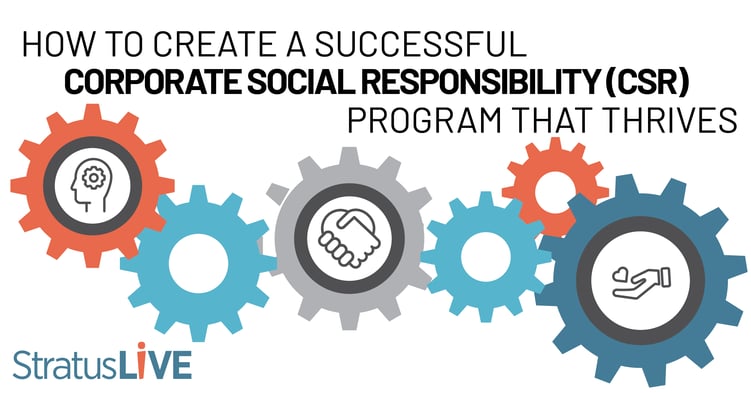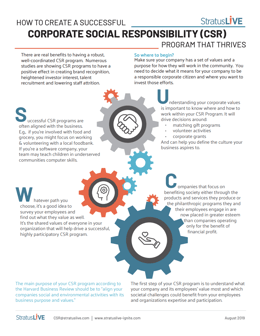
Most companies already practice some form of Corporate Social Responsibility (CSR) in the communities they work in, either through direct donations and sponsorships or employees volunteering for local charities. While CSR can be beneficial to your business, you shouldn’t design them as a method to increase profits.
Purpose and Benefits of a CSR Program
The main purpose of your CSR program according to the Harvard Business Review should be to “align your companies social and environmental activities with its business purpose and values.” Any direct benefits your company receives because of your CSR program should be viewed as a bonus and not the driving force.
But there are real benefits to having a robust, well-coordinated CSR program. Numerous studies are showing CSR programs to have a positive effect in creating brand recognition, heightened investor interest, talent recruitment and lowering staff attrition.
Where to begin
The first place to start is making sure your company has a set of values and a purpose for how they will work in the communities they operate in. You need to decide what it means for your company to be a responsible corporate citizen and where you want to invest those efforts.
Understanding your corporate values are important to know where and how you will work within your CSR Program. It will drive the decisions you make around matching gift programs, volunteer activities and corporate grants and help you define the culture your business aspires to. Corporate values help to define the behavior you support as you pursue profitability.
Align Your CSR Program with Your Purpose
Successful CSR programs are often aligned in some ways with the business purpose of the company. For example, if you're involved with food and grocery, you may want to design a CSR program with a primary focus of working and volunteering with agencies helping to eliminate hunger. If you’re a software company, you might want to focus on educational programs that teach children in underserved communities computer skills.
You might find the focus of your philanthropic efforts is not necessarily aligned with your products or services, but rather the needs of the communities your business is located in. Whatever path you choose, it’s a good idea to survey your employees and find out what they value as well. It’s the shared values of everyone in your organization that will help drive a successful, highly participatory CSR program.
In the not for profit world, organizations are created around a mission statement which is the core reason for them to operate; fulfilling the “mission statement” drives dollars into the organization and enables them to do the work promised by their mission. They may be financially profitable, but profits are not the driving force of why the organization came together.
For-profit companies, whether public or private are first organized around the creation of financial returns for owners and shareholders of the company. They have a purpose for being in business. But now, employees, investors and the communities they work in are expecting companies to be transparent about how they go about fulfilling their business purpose.
This is especially important to consumers who increasingly only want to make purchases from companies whose values align with their own. Today, people want to know the societal values a company believes in, they want them to demonstrate these values in the everyday actions they take and how they give back for the betterment of society.
If you produce a product, they are looking for sustainable operations that reduce waste and are not harmful to the environment. If you are a service provider, like a bank, they may want to know how you’re helping to improve the community you have branches in.
It’s important to try and align your CSR program with your companies’ business purpose, values, and the communities you have a presence in.
Companies that focus on benefiting society either through the products and services they produce or the philanthropic programs they and their employees engage in are now placed in greater esteem than companies operating only for the benefit of financial profit.
So, that’s a long way of saying the first step of your CSR program is to understand what your company and its employees’ value most and which societal challenges could benefit from your employees and organizations expertise and participation.
Check out our infographic for a quick study on this topic!
Click here for StratusLIVE Solutions for Federated Nonprofits







